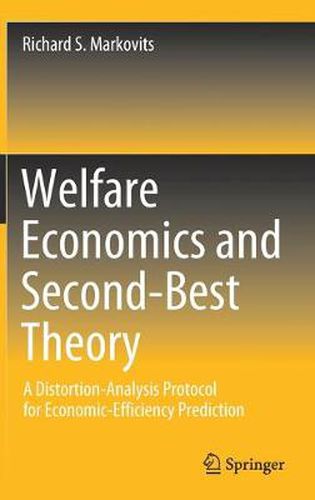Welfare Economics and Second-Best Theory: A Distortion-Analysis Protocol for Economic-Efficiency Prediction
Richard S. Markovits

Welfare Economics and Second-Best Theory: A Distortion-Analysis Protocol for Economic-Efficiency Prediction
Richard S. Markovits
This title is printed to order. This book may have been self-published. If so, we cannot guarantee the quality of the content. In the main most books will have gone through the editing process however some may not. We therefore suggest that you be aware of this before ordering this book. If in doubt check either the author or publisher’s details as we are unable to accept any returns unless they are faulty. Please contact us if you have any questions.
This book examines the implications of The General Theory of Second Best for analyzing the economic efficiency of non-government conduct or government policies in an economically efficient way. It develops and legitimates an economically efficient economic-efficiency-analysis protocol with three unique characteristics: First, the protocol focuses separately on each of a wide variety of categories of economic inefficiency, many of which conventional analyses ignore. Second, it analyzes the impact of conduct or policies on each of these categories of economic inefficiency, primarily by predicting the respective conduct’s/policy’s impact on the distortion that the economy’s various Pareto imperfections generate in the profits yielded by the resource allocations associated with the individual categories of economic inefficiency-i.e., on the difference between their profitability and economic efficiency. And third, it is third-best-i.e., it instructs the analyst to execute a theoretical or empirical research project if and only if the economic-efficiency gains the project is expected to generate by increasing the accuracy of economic-efficiency conclusions exceed the predicted allocative cost of its execution and public financing. The book also uses the protocol to analyze the economic efficiency of specific policies so as to illustrate both how it differs from the protocols that most applied welfare economists continue to use and how its conclusions differ from those produced by standard analysis.
This item is not currently in-stock. It can be ordered online and is expected to ship in 7-14 days
Our stock data is updated periodically, and availability may change throughout the day for in-demand items. Please call the relevant shop for the most current stock information. Prices are subject to change without notice.
Sign in or become a Readings Member to add this title to a wishlist.


